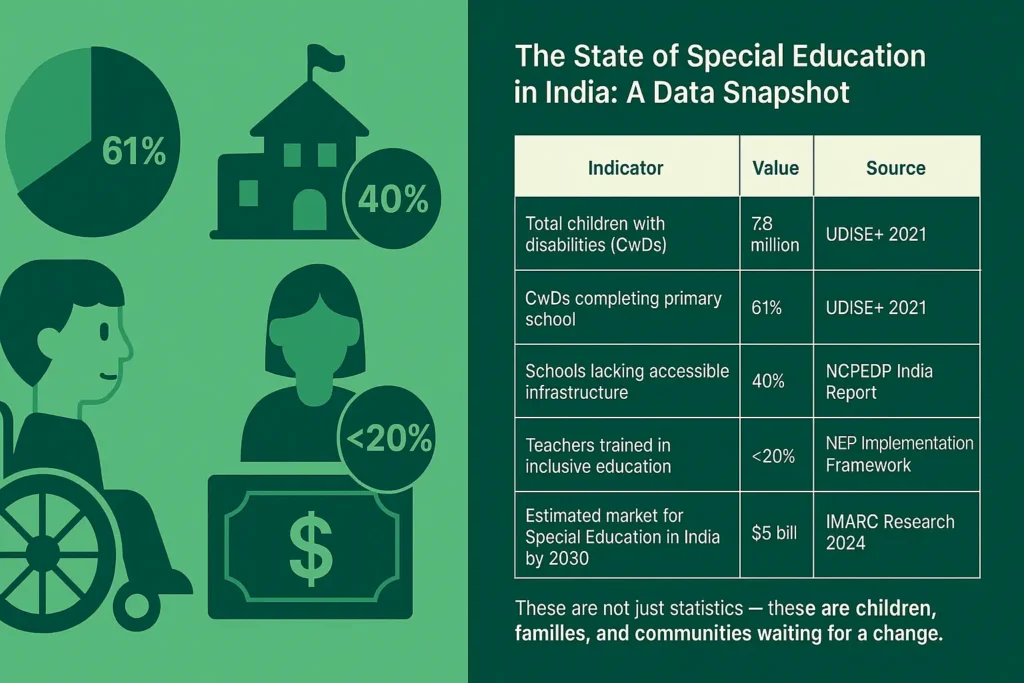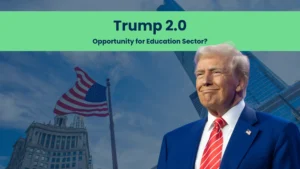“Inclusion is not bringing people into what already exists; it is making a new space, a better space for everyone.”
In India’s vibrant, diverse, and ambitious education ecosystem — one that serves over 265 million students — there lies a pressing, often invisible challenge: inclusion.
Among these millions of learners, 7.8 million children live with disabilities (as per UDISE+ 2021). Yet, a significant percentage of them are locked out of meaningful, quality education due to the absence of tailored pedagogies, accessible infrastructure, and inclusive teaching practices.
As the world moves rapidly toward educational equity, India’s Special Education Needs (SEN) sector stands at a crucial inflection point — one filled with hope, opportunity, and the urgent need for innovation.

The Unseen Gaps: Numbers That Matter
While India has embraced inclusive education through frameworks like the National Education Policy (NEP) 2020 and the Rights of Persons with Disabilities (RPWD) Act, 2016, the ground reality paints a sobering picture:
- 61% of children with disabilities complete primary school, but this number drops significantly by secondary education (UDISE+).
- 40% of Indian schools still lack basic infrastructure to support children with special needs.
- Fewer than 20% of educators receive formal SEN training (Source: NCERT).
This disconnect doesn’t just impact academics — it emotionally scars families, burdens caregivers, and leaves behind a generation of potential that could be our future scientists, leaders, and innovators.
Want to dive deeper into how these numbers are shaping the future of inclusive learning? Read:
🔗 A Silent Struggle in Indian Classrooms: Special Education Needs
A Call for Global Innovation — But Tailored to India
India’s Special Education sector is vastly underserved but rapidly growing. Valued at an estimated $2.8 billion in 2024, the market is expected to reach $5 billion by 2030, growing at 15% CAGR (Source: IMARC Group).
This market is no longer a “niche”—it’s a mission-critical segment for global edupreneurs. Leaders in assistive tech, inclusive digital content, and learning science like IDL, Cognition Labs, Ghotit, and others have created powerful solutions internationally. These tools—if localized properly—can help redefine learning outcomes for India’s SEN students.
Explore more on the market outlook and opportunity:
🔗 India’s Special Education Market: A $2 Billion Untapped Opportunity for Global Leaders
Why India Is the Next Epicentre of Inclusive Learning
The Scale:
- 265M+ school-going students, the largest K–12 population in the world.
- 45,000+ higher education institutions and 97,000+ private unaided schools.
- 1.5 million schools across urban and rural India.
- A network of 83,000+ educational institutions and 51,000+ educators — actively engaged through platforms like India Market Entry.
The Shift:
- NEP 2020 explicitly advocates for inclusive, multidisciplinary education.
- AI and digital adoption among schools has increased 5x since 2020.
- Hybrid and assistive learning is now being integrated into teacher training, CSR outreach, and EdTech investments.
Every delay in implementing inclusive solutions is a lost chance — not just for these learners, but for India as a nation seeking to lead in global innovation, creativity, and entrepreneurship.
What’s Needed from Global Edupreneurs?
✅ Adaptable Technology
Solutions must be scalable, device-friendly, and multilingual. 22 official Indian languages — and many more regional dialects — need content localization and inclusive UI/UX.
✅ Teacher Empowerment
With over 80% of Indian teachers unfamiliar with SEN teaching strategies, training modules must come built-in with assistive solutions.
✅ Blended Learning Content
Offline access, gamified feedback, and culturally relevant examples will be key in ensuring student engagement and retention.
✅ Strong Local Partnerships
Working with implementation experts on the ground — such as inclusive education consultants, state boards, or national partners — will determine long-term success.
A Final Thought: It’s Not Just Business. It’s Human.
The Indian SEN space isn’t just another opportunity to scale — it’s a chance to make history. A chance to empower 7.8 million dreams currently muted by systemic gaps.
It’s a space where impact precedes income, where solutions must fit the learner, not the other way around.
And where global leaders in inclusive education can rewrite the future of millions — by doing the right thing, at the right place, at the right time.
That time is now. Contact us to know more.





